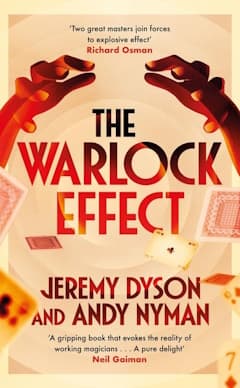
The Warlock Effect by Jeremy Dyson and Andy Nyman
(Hodder & Stoughton, 2023)
Reviewed by Dave M. Roberts
The first page of this book is a ‘Reader’s Secrecy Covenant’, reminiscent of the announcement at the end of Dyson and Nyman’s play Ghost Stories in which the audience was asked not to reveal any details of the play. The reader starts by being implored not to reveal any revelations contained in the book. In this case, it’s actually a book within the book that the covenant strictly applies to. Even so, the reader is being set up with the expectation that there will be twists and revelations, and foreknowledge of these would spoil the experience. Whilst this is true of most good fiction, the reveals in this novel feel like the explanation for a stage illusion. Once understood most, if not all, of the magic has gone.
Young Ludvik Weinschenk is a German Jewish refugee being boarded at an English school, who uses close up magic to avoid bullying by his classmates. In a brief scene he demonstrates not only his remarkable skill in this arena, but also his innate showmanship. Twelve years later he is at the peak of his profession as a magician, the titular Louis Warlock—a sort of 1950s Derren Brown. In fact, Andy Nyman is a magician who has collaborated with Derren Brown for many years, so it can only be assumed that the description of the way that the illusions are accomplished has some substance in reality. There is certainly a very real and believable feel to this.
During a performance of his mind reading act, he is publicly accused of being a fraud, and challenged to prove his abilities with a seemingly impossible challenge. To find his partner, located anywhere in London, and get from her a secret message within a short window. Happily accepting the challenge, and apparently making it harder for himself, we get a display of the way that this type of challenge is approached, the way he operates as a part of a team, and ultimately, of course, he is successful. Although in the end it turned out to be rather more a close run thing than expected. All this brings his skills to the attention of the British Secret Services, who recruit him for their own purposes. This ultimately takes him across Europe on an extremely dangerous mission. Separated from his Brains Trust, Warlock is now completely on his own.
The book within the book is a memoir in the form of an introductory work explaining the techniques of a stage magician. The introduction makes it clear that this is for a very limited audience. Alongside the secrecy covenant, there is a note stating that all the printing plates are to be destroyed once the initial print run is complete. Interspersed throughout the novel, it is not immediately apparent what the purpose of this is. Apart from showing some of the methods of a stage magician, it appears to have no immediate connection to the plot. Understanding who it is aimed at and why it has been written is where much of the emotional impact of the novel lies. There is definitely a feeling that the author is wanting to pass on something when they can’t directly show their feelings, although it’s not immediately apparent what that is.
To a large extent, this is a relatively straightforward thriller. There is nothing of the supernatural nor any indication that there might be. However, given this is a novel concerning carefully staged illusions it should come as no surprise that things are rarely what they appear to be, and many of the apparent twists in retrospect shouldn’t really have been a surprise and much hidden in plain sight. Whilst this is an interesting and engaging novel, it falls short of Dyson’s solo work, and perhaps being too concerned with mechanics of the illusion, it lacks the impact and emotional resonance of Ghost Stories.
Review from BSFA Review 21 - Download your copy here.
